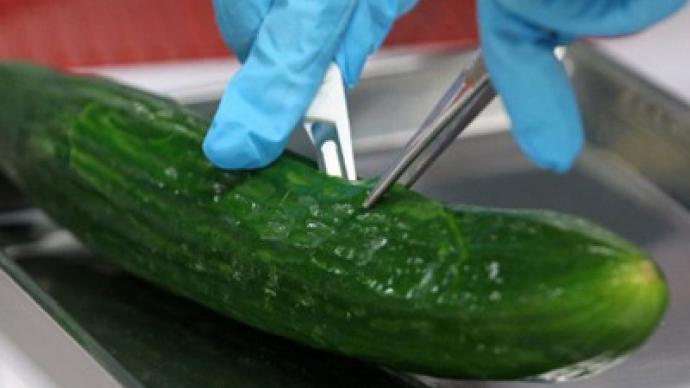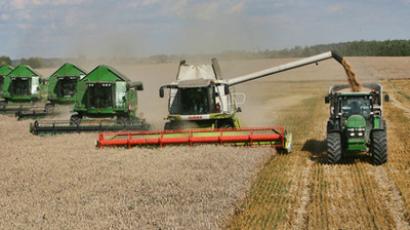Russia cuts vegetable imports from Europe amid contamination fears

Russia banned the import of German and Spanish vegetables following a deadly outbreak of E. coli in Europe.
The head of Rospotrebnadzor and Russia's chief sanitary official, Gennady Onishchensko, on Monday announced the decision to halt the import of vegetables including tomatoes, cucumbers and salad from Spain and Germany. However, the sanction may be applied to all European countries if the situation does not improve said the wachdog of consumer product control agency "This measure stems from the outbreak in Germany, Sweden, Denmark, Holland and Great Britain of the acute intestinal infection caused by Enterohaemorrhagic E. coli. Moreover, in the coming hours, a decision may be taken to ban the import to or sale in Russia of vegetables produced in all EU countries," Onishchenko advised Russians to eat only locally-grown greens, adding that all vegetables already imported from Germany and Spain would be recalled."We are calling on the population not to purchase fresh vegetables from Germany and Spain. Domestic products are safe for consumption,” Russia’s consumer product control agency has shown suspicious perseverance in health and product quality control in past occasions to ban the import of products which are also produced locally for health-related reasons, which has led to critics accusing the authorities of unfairly helping local producers. Maria Kournossova, head of external communications for Auchan, says this restriction can impact only retailers importing vegetables from Europe“Auchan does not work with European vegetable exporters. The whole chain offers vegetables of local producers from Russian agricultural farms. Thus this measure will neither impact us nor our customers,”Lavrenty Gubin, a DIXY PR representative, said the share of vegetable imports from Europe is declining on the back of domestic agricultural improvements “We are not purchasing vegetables, notably, cucumbers and tomatoes from recently-infected agricultural areas of Spain and Germany. What’s more, we have never imported vegetables from Germany. Spain was one of the suppliers of the so-called Spanish cucumber, which now have comparatively low demand from the population, which is opting for domestic and neighboring countries’ brands. In relation to the import of tomatoes, we deal mainly with Polish, Dutch, Belgian and Turkish suppliers, however, we believe that the share of local suppliers will grow. Given that, we are not expecting the recent regulatory measures to affect consumer prices and country supply.”Ekaterina Andreyanova, analyst at Rye, Man & Gor Securities, says the situation can develop in two opposite scenarios but will have a short-term influence “Until the parties have discovered the real cause and a practical solution to overcome the infection that harms vegetables and infects humans the ban will remain as the only measure to protect the Russian population. However, I believe this is a temporary measure that on one hand could pave the way for Russian local agricultural producers, enabling them to cement their position on the market by being the first choice for consumers, while on the other hand could lead to a short-term product deficit on the market, assuming that Russian vegetable producers are not ready to meet the market demand with low volumes of yields due to seasonal factors,” Dmitry Yanin, the head of the InternationalConfederation of Consumer Societies, said the import regulation measure is neutral for Russian vegitables market given that no deficit is predicted "The time for bringing in the ban is the most undisturbed.The local harvest has already come from Russia and nearby CIS countries. The ban on the import of fresh vegetables from the EU will have a minimal or negligible influence on prices. Prices for carrots, cucumbers and cabbage usually decrease in Russia in June-July. The suspension of imports from the EU will have no substantial influence,"














